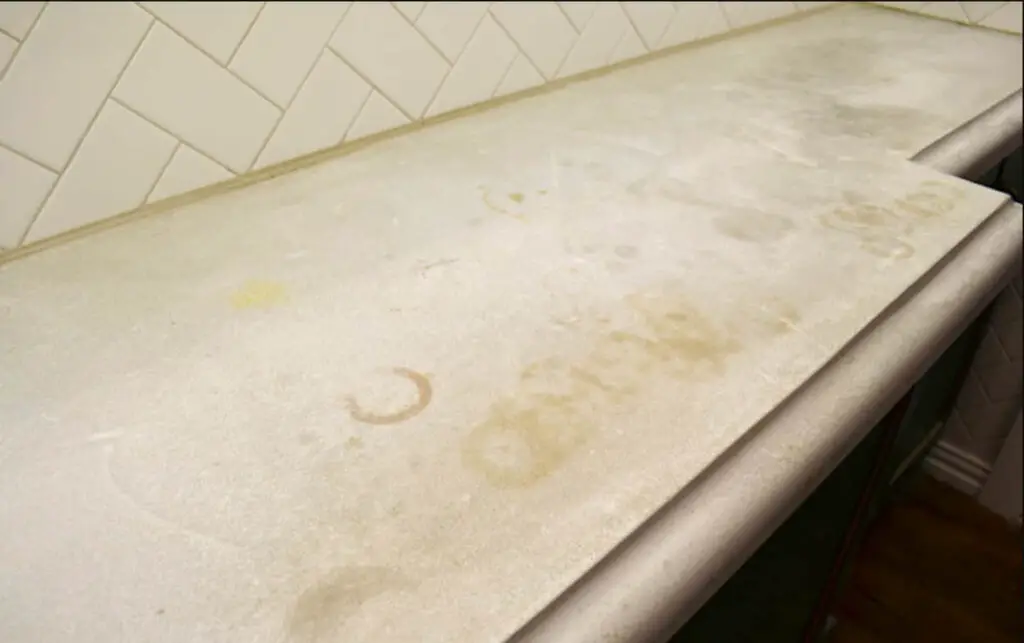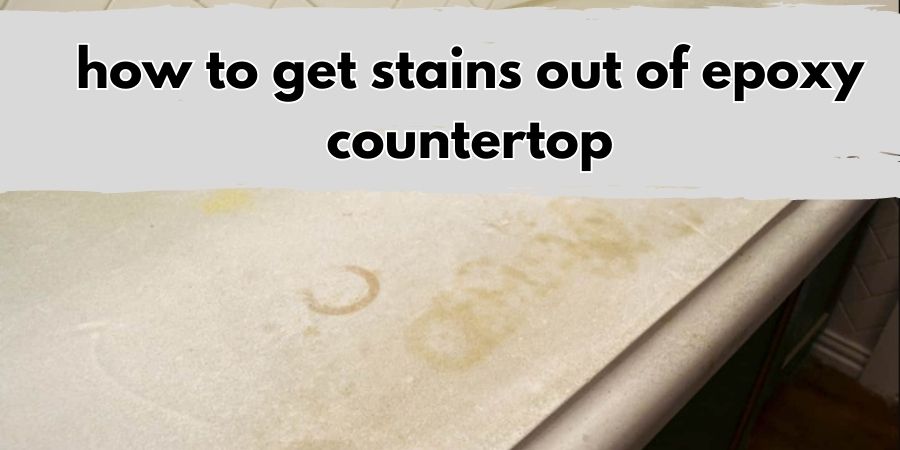Epoxy countertops are known for their durability and resistance to stains, but accidents can still happen.
Here are some tips for removing stains from your epoxy countertop:

Oil and Grease Stains: Quickly soak up the excess with a clean cloth, then create a paste of baking soda and water. Apply the paste to the stain and let it sit for 30 minutes before wiping it away with a damp cloth.
Coffee and Tea Stains: Mix equal parts of water and white vinegar, then apply the solution to the stain. Let it sit for 15 minutes before wiping it away with a clean cloth.
Red Wine Stains: Immediately blot the stain with a dry cloth, then mix equal parts of hydrogen peroxide and water. Apply the solution to the stain and let it sit for 30 minutes before wiping it away with a clean cloth.
Ink Stains: Apply rubbing alcohol to the stain and let it sit for 30 minutes before wiping it away with a clean cloth.
Rust Stains: Mix equal parts of lemon juice and baking soda, apply to the stain, and let it sit for 30 minutes before wiping it away.
Best cleaners for epoxy countertops
Mild Dish Soap: A mild dish soap and warm water solution is a safe and effective cleaner for epoxy countertops. It can remove dirt, grime, and grease without damaging the surface.
Vinegar and Water: A mixture of equal parts white vinegar and water is an excellent natural cleaner for epoxy countertops. It is effective in removing stains, disinfecting the surface, and eliminating odors.
Baking Soda and Water: Baking soda is a natural abrasive that can effectively remove stubborn stains and grime from epoxy countertops. Mix baking soda and water to create a paste, apply it to the stain, and scrub with a soft-bristled brush.
Rubbing Alcohol: Rubbing alcohol is another effective cleaner for epoxy countertops. It can remove ink, marker, and other stubborn stains. Apply a small amount of rubbing alcohol to the stain and wipe it away with a clean cloth.
Non-Abrasive Cleaners: There are many non-abrasive commercial cleaners designed specifically for epoxy countertops. These products are safe for regular use and can help maintain the shine and appearance of your countertop.
FAQ on cleaning epoxy countertops:
Q: What should I avoid when cleaning my epoxy countertop?
A: Avoid using harsh chemicals or abrasive cleaners as they can damage the surface of your epoxy countertop.
Q: How often should I clean my epoxy countertop?
A: It’s recommended to clean your epoxy countertop regularly, at least once a week, to maintain its shine and appearance.
Q: Can I use a scrub brush to clean my epoxy countertop?
A: Yes, you can use a soft-bristled brush or sponge to clean your epoxy countertop, but avoid using a scrub brush as it can scratch the surface.
Q: Can I use vinegar to clean my epoxy countertop?
A: Yes, a mixture of equal parts white vinegar and water is an excellent natural cleaner for epoxy countertops. It’s effective in removing stains, disinfecting the surface, and eliminating odors.
Q: Can I use bleach to clean my epoxy countertop?
A: No, it’s not recommended to use bleach on epoxy countertops as it can damage the surface.
Q: Do I need to seal my epoxy countertop?
A: No, epoxy countertops do not require sealing as the epoxy itself acts as a sealant.
Q: Can I use a steam cleaner on my epoxy countertop?
A: No, it’s not recommended to use a steam cleaner on epoxy countertops as the high heat can damage the surface.






